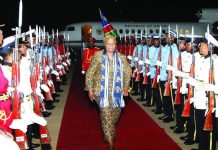Africa-Press – Namibia. THE government yesterday insisted that the lack of salary increments for civil servants is not linked to a N$4,5 billion International Monetary Fund (IMF) loan.
This comes amid trade unions drafting strike rules after more than 42 000 public servants voted in favour of industrial action over the lack of salary increments last week.
The IMF approved a loan of US$270,83 million (N$4,5 billion) to Namibia under the Rapid Financing Instrument (RFI) in 2021.
“The IMF loan has no bearing on the government’s stance on civil servant wages, and the loan did not come with any such conditions.
“We have reiterated this in the clarifying statement we issued on the IMF loan, and that position still stands,” Ministry of Finance spokesperson Wilson Shikoto said yesterday.
Shikoto said the government would continue to implement its zero-increment policy
“. . . as we have outlined the fiscal policy stance in the budget speech we tabled in February,” he said.
Despite reports that the government got the loan on condition there would be no pay hikes for civil servants, the ministry maintains that the RFI loan appraisal recognises the reforms.
Namibian Sun last year reported that the IMF attached certain conditions to the loan.
One of the conditions was reportedly that the Namibian government should suspend wage increments for public employees for five years.
These reforms were stated in the government’s letter of intent to the IMF.
“The commitments expressed in the letter of intent are a reaffirmation that the government will continue to implement the broad spectrum of national policy measures to manage fiscal risks, and support economic recovery and inclusive growth going forward,” minister of finance Iipumbu Shiimi said after the letter was published.
Part of these measures included managing the increase in the wage bill, which is one of the main drivers of public spending, through net vacancy freeze and no upward remuneration adjustment through the collective bargaining process.
By the fourth quarter of 2021, the government’s wage bill stood at N$ 6,3 billion.
The IMF, when it announced the approval, said the government was expected to implement a growth-supporting medium-term fiscal consolidation aimed at preserving debt sustainability.
“To this end, moving forward with planned fiscal reforms to increase expenditure efficiency and mobilise additional tax revenues will be key. Structural reforms remain essential to promote broad-based, inclusive growth,” the fund said in a statement issued last year.
An Oxfam international report published on 19 April stated that 10 countries, including Kenya and Namibia are likely to freeze or cut public sector wages and jobs.
“ . . . which could mean lower quality of education and fewer nurses and doctors in countries already short of healthcare staff. Namibia had fewer than six doctors per 10 000 people when Covid-19 struck,” the report reads.
The analysis by Oxfam and Development Finance International also reveals that 43 out of 55 African Union member states face public expenditure cuts totaling $183 billion over the next five years.
“If these cuts are implemented, their chances of achieving the UN’s Sustainable Development Goals would likely disappear,” the report stated.
STRIKE IMPLICATIONS
Economist Salomo Hei this week said the IMF loan has no bearing on the salaries or increments debated.
“However, the IMF and international organisations operate on information that’s being provided, so any deviation from that could have implications for any future engagements,” he said.
He said the RFI is designed by the IMF as an instrument which provides rapid financial assistance to its member states facing “urgent balance of payment needs or economic shocks”.
“Current economic conditions dictate that there are liquidity constraints which make it extremely difficult. Reallocation could be an alternative, and that will mean everyone has to show skin in the game,” Hei said.
Another economist, Theo Klein, said public administration services comprise about 10% of gross domestic product, which is a large portion of our economy that could be underperforming in the event of a prolonged strike.
“However, if the strike is only to last one or two days, we do not see a sizable negative impact on the economy,” he said.
As a result, he believes the government may have to increase other sources of revenue (such as increasing tax rates) or borrow more from local or foreign investors to pay its bills.
“A further implication is that we may see certain sacrifices on other services or priorities that form part of the government’s expenditure bill,” Klein said.
NO EXCUSES
Trade Union Congress of Namibia (Tucna) secretary general Mahongora Kavihuha yesterday said: “We have warned our government that they cannot go down that road where they have to borrow money from the IMF, because the IMF always has conditions.
“You see how the structural adjustment programmes have affected many African countries.”
Kavihuha said the government is always slow to learn from the negative experiences of other countries.
“So that policy to us is not an issue and we are not going to adhere to it. We are not entertaining it,” he said.
Kavihuha said he believes the government has money available for salary increments.
“And we know that the government, if they make political decisions, that money will be available and it will never be a loss to the government.
“We are saying people are suffocating in poverty, and prices have increased,” he said.
Public Service Union of Namibia (PSUN) secretary general Ndjizuvee Haakuria says the decision of the government to collaborate with the IMF was erroneous and will haunt them for years.
“The IMF imposed this condition on the government to ensure there is sufficient funds to service the loan, an old capitalist trick. Why did the government agree to such a silly condition from the IMF? Which union did they consult?”
Haakuria says the unions are reasonable in asking the government for salary increases for civil servants, since they have not had any for seven years.
He said it is up to the government to get its priorities right.
“They are unwilling to let go of this extravagance, but want to sacrifice a salary increment. We must all be serious when times are hard,” he said.
For More News And Analysis About Namibia Follow Africa-Press






